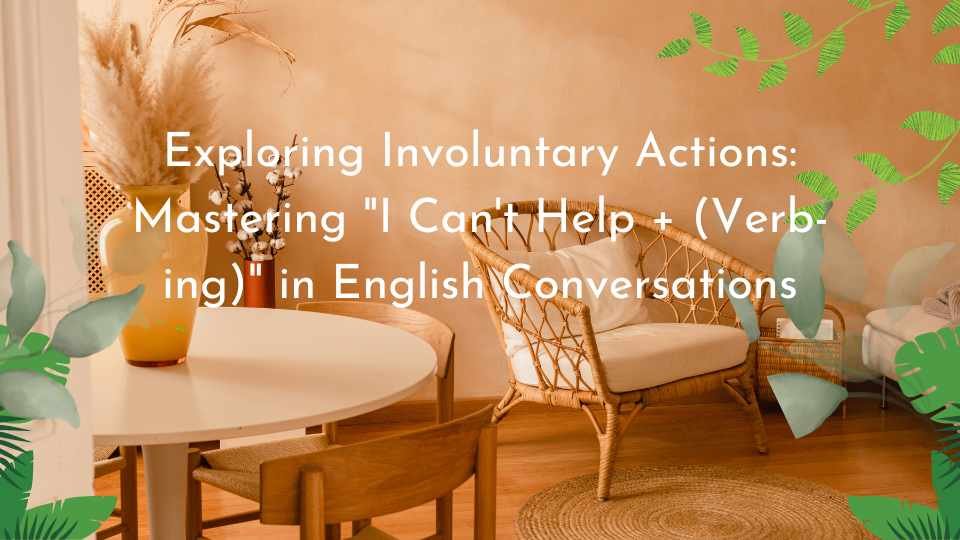Are you curious about expressing actions or behaviors that you find irresistible or involuntary in English conversations? Understanding and utilizing the “I can’t help + (verb-ing)” format can enrich your ability to convey spontaneous reactions and impulses. In this blog, we’ll delve into this intriguing structure with numerous real-life examples to help you master its usage effectively.
Exploring Involuntary Actions: Mastering “I Can’t Help + (Verb-ing)” in English Conversations
-
Introduction to “I Can’t Help + (Verb-ing)”:
“I can’t help + (verb-ing)” is a captivating structure in English used to express actions or behaviors that are irresistible or involuntary. Mastering this format allows you to communicate your spontaneous reactions with authenticity and clarity. -
Expressing Irresistible Urges:
One of the primary uses of “I can’t help + (verb-ing)” is to express irresistible urges or impulses. Let’s explore some examples:- “I can’t help laughing when I see that funny meme; it’s just too hilarious.”
- “I can’t help smiling whenever I see my pet; they always brighten my day.”
- “I can’t help singing along to my favorite song; it’s so catchy.”
-
Expressing Natural Reactions:
Beyond urges, “I can’t help + (verb-ing)” can also be used to express natural reactions or responses. Consider these examples:- “I can’t help feeling nervous before a job interview; it’s just a natural response.”
- “I can’t help feeling emotional during sad movies; they always tug at my heartstrings.”
- “I can’t help blushing when someone gives me a compliment; it’s involuntary.”
-
Expressing Uncontrollable Impulses:
“I can’t help + (verb-ing)” can also be employed to express uncontrollable impulses or actions. Explore these examples:- “I can’t help checking my phone constantly; it’s become a habit.”
- “I can’t help eating chocolate when it’s in front of me; it’s my weakness.”
- “I can’t help procrastinating when faced with a daunting task; it’s a challenge to overcome.”
-
Expressing Sympathy or Understanding:
In addition to personal experiences, “I can’t help + (verb-ing)” can be used to express sympathy or understanding towards others’ actions. Take a look at these examples:- “I can’t help feeling sorry for him; he’s going through a tough time.”
- “I can’t help admiring her dedication to her craft; she’s truly passionate.”
- “I can’t help empathizing with their situation; I’ve been there before.”
-
Joining Guruji English Classes:
If you’re committed to advancing your English language skills and achieving fluency, consider enrolling in Guruji English Classes. Our comprehensive courses are designed to cater to learners of all levels, providing expert instruction and valuable resources to support your journey. Don’t hesitate to contact us at 9759999231 to explore our FREE English Speaking course and take the next step towards proficiency.
By incorporating the “I can’t help + (verb-ing)” format into your daily conversations, you’ll not only enhance your English fluency but also convey your spontaneous reactions and impulses with authenticity and clarity. Join Guruji English Classes and unlock your potential to communicate effectively in any situation.
So, what are you waiting for? Start using “I can’t help + (verb-ing)” in your everyday speech and express your natural reactions and impulses with authenticity and spontaneity. Remember, embracing your involuntary actions adds depth and authenticity to your interactions.
